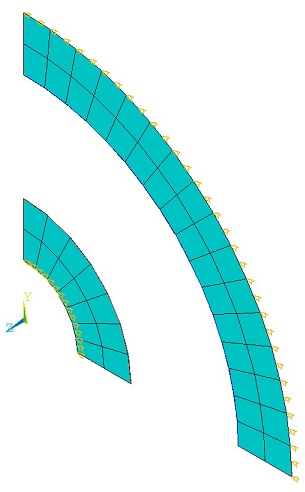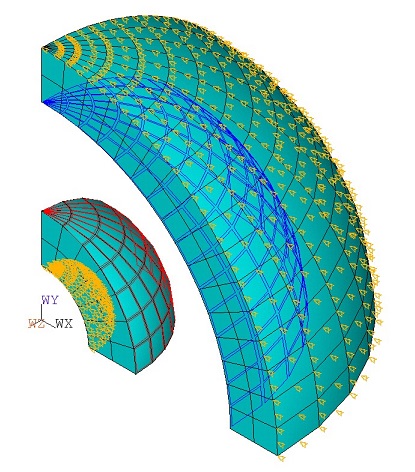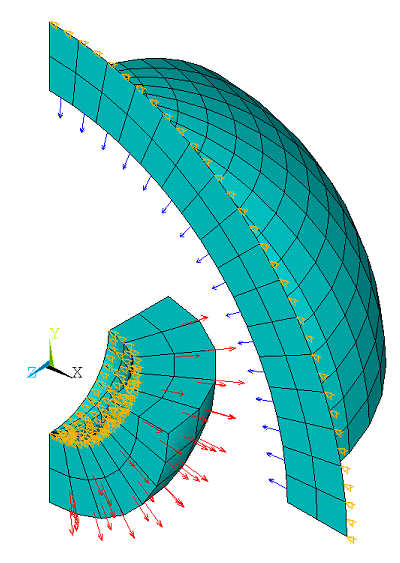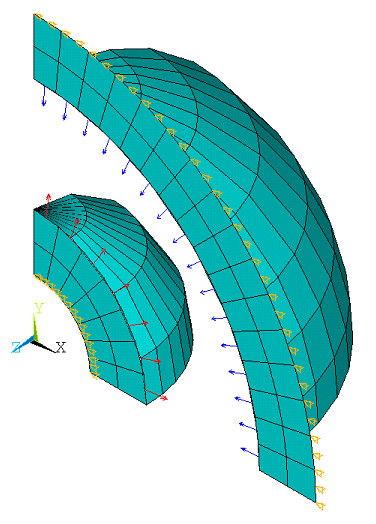VM230
VM230
Radiation Between Two Concentric Spheres
Overview
| Reference: | Radiative Heat Transfer, Michael F. Modest, 3rd Edition, pp. 205-206 |
| Analysis Type(s): | Steady State Radiosity |
| Element Type(s): | |
| Input Listing: |
VM230 requires supplemental .cdb input files which are too long to include full input listings. These files must be downloaded and placed in your working directory for the test case to run properly. Additionally, the geometry and mesh should be regenerated. Download link: MAPDL Test Case Files for 2024 R2 vm230-1.cdb, vm230-1.rsm vm230-2.cdb, vm230-2.rsm vm230-3.cdb, vm230-3.rsm |
Test Case
Determine the view factors and radiative heat flux between two concentric spheres with radii
R1 and R2, temperatures T1
and T2, and emissivity and
.
| Material Properties | Geometric Properties | Loading | |||||||||||||
|---|---|---|---|---|---|---|---|---|---|---|---|---|---|---|---|
|
|
|
Analysis Assumptions and Modeling Notes
The problem is solved for three cases.
In the first case, the problem is solved by modeling the spheres using 2D axisymmetric thermal elements/radiosity surface elements PLANE77 and SURF251 and 3D thermal solid elements/radiosity surface elements SOLID90 and SURF252 with different radiation enclosure in the same preprocessing. The radiative symmetries for both the 2D and 3D models are specified using the RSYMM command. The radiosity surface elements are defined on the exterior of the inside sphere and the interior of the outside sphere using the RSURF command. Emissivity value sare defined on the facing surface using SF,,RDSF and temperatures T1 and T2 are specified at the non-facing surfaces, as shown in Figure 382: Problem Sketch,Figure 383: Finite Element Model Using PLANE77 and SURF251 Elements, and Figure 384: Finite Element Model Using SOLID90 and SURF252 Elements.
In the second case, the inner sphere is modeled using 3D solid
thermal elements/radiosity elements SOLID90 and
SURF252 and the external sphere is modeled using 2D axisymmetric
thermal elements PLANE77 and 3D radiosity surface elements
SURF252. The problem is solved with the same radiation enclosure.
Axis = CENT is defined on the RSYMM command in the
2D case to circumferentially extrude the radiosity surface by SURF252
elements from 2D PLANE77 elements. The radiative symmetries, radiosity
surface elements, emissivity values, and temperatures are defined as described for the first case
and as shown in Figure 385: Finite Element Model Using PLANE77,
SOLID90, and SURF252 Elements.
In the third case both the inner sphere and external sphere are
modeled using 2D axisymmetric thermal elements PLANE77 and 3D
radiosity surface elements SURF252. As mentioned in the second case, the
SURF252 elements are generated from 2D
PLANE77 elements using Axis = CENT on the
RSYMM command. The radiative symmetries, radiosity surface elements,
emissivity values, and temperatures are defined as described in the first case and as shown in
Figure 386: Finite Element Model Using PLANE77 and
SURF252 Elements.
View factors between two radiative sphere surfaces should satisfy basic rules of view factors:
, no radiation can leave the inner surface and then hit it later
, perfect enclosure, no radiation to space
The analytic solution for heat flux from the exterior of the inner sphere (equation 5.35 in the reference) is:
(230–1) |
Because of conservation of energy, . The analytic value for heat flux from the interior of the outer sphere is
Results Comparison
| Target | Mechanical APDL | Ratio | |
|---|---|---|---|
| PLANE77 and SURF251 | |||
| F11 | 0.000 | 0.000 | 0.00 |
| F12 | 1.000 | 1.000 | 1.00 |
| F21 | 0.250 | 0.248 | 0.99 |
| F22 | 0.750 | 0.752 | 1.00 |
| Heat flux (interior) at node(1,10,0) | 809.842 | 772.704 | 0.95 |
| Heat flux (exterior) at node(2,10,1) | 202.460 | 208.207 | 1.03 |
| SOLID90 and SURF252 | |||
| F11 | 0.000 | 0.001 | 0.00 |
| F12 | 1.000 | 0.999 | 1.00 |
| F21 | 0.250 | 0.247 | 0.99 |
| F22 | 0.750 | 0.753 | 1.00 |
| Heat flux (interior) at node(1,10,0) | 810.324 | 777.465 | 0.96 |
| Heat flux (exterior) at node(2,10,1) | 202.581 | 201.014 | 0.99 |
| PLANE77, SOLID90, and SURF252 | |||
| F11 | 0.000 | 0.000 | 0.00 |
| F12 | 1.000 | 1.000 | 1.00 |
| F21 | 0.250 | 0.247 | 0.99 |
| F22 | 0.750 | 0.753 | 1.00 |
| Heat flux (interior) at node(1,10,0) | 805.732 | 780.196 | 0.97 |
| Heat flux (exterior) at node(2,10,1) | 201.433 | 200.394 | 0.99 |
| PLANE77 and SURF252 | |||
| F11 | 0.000 | 0.000 | 0.00 |
| F12 | 1.000 | 1.000 | 1.00 |
| F21 | 0.250 | 0.249 | 1.00 |
| F22 | 0.750 | 0.751 | 1.00 |
| Heat flux (interior) at node(1,10,0) | 809.788 | 774.725 | 0.96 |
| Heat flux (exterior) at node(2,10,1) | 202.447 | 202.149 | 1.00 |






